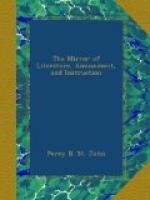Shakspeare has said, “What’s in a name?—a rose, by any other name, would smell as sweet!” But here we have a convincing proof of the necessity of attending strictly to names, as the commonest regard to the fitting attributes of a “John Jones,” would have kept the victim of such an appellation quite clear of poetry. It is next to impossible that a John Jones should be a poet;—and some kind friend should have broken the truth to the butler, before he endeavoured to share unpolished glory with uneducated bards.
An inspired serving-man, in a livery of industry, turned up with morality, is a species of bard which we never expected to find in the service of the Muses, or bringing a written character from his last place, and vaunting of his readiness and ability to write epics and wait at table. The work we should have looked to meet with, emanating from the butler’s pantry, was a miscellaneous volume full of religious scraps, essays on dress, receipts for boot-tops, wise cooking cogitations, remedies for bugs, cures for ropy beer, hints for blacking, ingredients for punch, thoughts on tapping ale, early rising and killing fleas. The mischief of the wide dissemination of education is now becoming apparent, for, poor as authors confessedly are, they have generally been gentlemen, even in rags—learned men of some degree, though with exposed elbows—folk only a little lower than the angels! But never until the schoolmaster was so abundantly abroad, distributing his spelling-soup to the poor, did we ever hear of a butler writing poetry, and committing it to the press. The order of things is becoming reversed. The garret is beginning to lose its literary celebrity, and the kitchen is taking the matter up. A floor near the sky in Grub-street is no pen-spot now; but down fifty fathoms deep in Portland Place, or Portman Square, or some far-retired old country house, you shall find the author: his red cuffs turned up over his light blue jacket sleeves, the pen in his hand, and his inspired eye looking out upon the area. There doth he correct the brain-work which is to carry his name up above the earth, and keep it there, bright as cleaned plate. In the housekeeper’s room, inspiration gives a double knock at his heart. An author in a pantry certainly writes under great disadvantages, for it cannot be said that he is there writing for his bread. In such a place, the loaf is in his eye—the larder is so near, he may almost dip his pen into it by mistake—and positive beef gleams through the veil of the safe, softened to his eye, yet still solider than beef of the imagination. In truth, a man has much to overcome in preparing food for the mind, in the very thick of food for the body;—for a good authority (no less a man than Mr. Bayes) has strenuously advised that the belly should be empty when the brain is to be unloaded. How can a gentleman’s gentleman, with a corpus that banishes his backbone nearly four feet from the table at which he sits, betake




